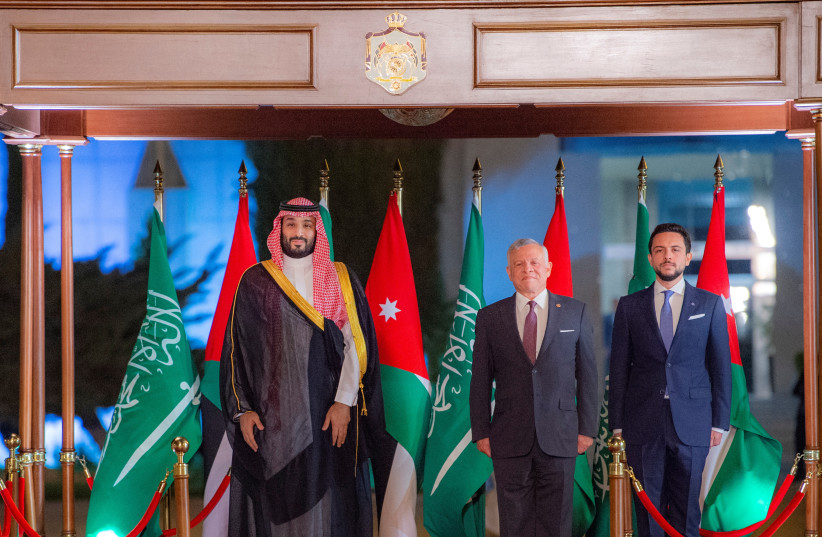The planned visit by US President Joe Biden to the Middle East next month is highlighting shifts in the region. Although Biden will be visiting Israel and the Palestinian Authority, the spotlight is on his trip to Saudi Arabia for a regional meeting. His predecessor, Donald Trump, together with then-prime minister Benjamin Netanyahu, created the Abraham Accords in 2020, a treaty linking Israel with the United Arab Emirates, Bahrain, Morocco and Sudan. These were strengthened under the Bennett-Lapid government as was particularly evident in March, when Lapid managed to convene the foreign ministers of four Arab countries and US Secretary of State Antony Blinken at the Negev Summit.
It’s clear that regional cooperation offers major economic and development benefits, however, that is not the main impetus behind the accords. Israel and the Sunni and Arab world are growing closer because of the shared threat of a nuclear Iran. Today, Israel is becoming recognized more than ever as a part of the Middle East that has an essential role to play. The Negev Summit gave rise to renewed talk of a Middle Eastern “NATO.”
At the summit in Sde Boker, Lapid declared, “The shared capabilities we are building intimidates and deters our common enemies – first and foremost, Iran and its proxies.” When the meeting was overshadowed by a terrorist attack, the Arab foreign ministers attending the event condemned the atrocity.
“The shared capabilities we are building intimidates and deters our common enemies – first and foremost, Iran and its proxies.”
Yair Lapid
The Iranian threat – both its nuclear aspirations close to fruition and its support of terrorism through its proxies including Hezbollah, Hamas and the Houthis in Yemen – presents a challenge to the Sunni Arab states as well as to Israel. The dangers are helping countries pull together. On Wednesday, for instance, Jordan and Saudi Arabia jointly announced their support for international efforts to prevent the Shi’ite Islamic Republic from acquiring nuclear arms.
A joint statement issued at the end of the visit by Saudi Crown Prince Mohammed bin Salman to Jordan, where he held talks with King Abdullah and Crown Prince Hussein, declared, “The two sides stressed the importance of redoubling efforts to confront extremism and work to combat terrorism in all its forms, confront its ideological roots, dry up its sources, stop all means of financing it and spread the values of religious, cultural and moderation.”
The two kingdoms also expressed support for Arab efforts to urge Iran to stop meddling in the internal affairs of Arab countries and avoid all “destabilizing activities.” They condemned the terrorist attacks against Saudi Arabia carried out by the Iranian-back Houthis in Yemen.

The Biden administration is reportedly helping finalize the transfer of the Red Sea islands Tiran and Sanafir from Egpyt to Saudi Arabia, with Israel’s consent. That could also mark part of a move to improved relations between Jerusalem and Riyadh, which so far remains outside the Abraham Accords. Normalization of relations between Israel and the Saudis remains an important goal. This, too, would be based on joint security interests in the face of Iranian aggression, but could lead to much greater cooperation in other important economic fields.
Similarly, relations between Israel and Turkey have known many ups and downs over the years, but currently they are warming up, also pushed by the joint need to tackle Iran. That’s the reason Lapid flew to Ankara yesterday to meet with his Turkish counterpart Mevlut Cavusoglu. Turkish authorities have been cooperating with Israel over the red alert for Iranian attacks on Israeli citizens that saw vacationers in Turkey lock themselves in their hotel rooms in the face of imminent threats.
Earlier this month, Prime Minister Naftali Bennett announced his so-called “Octopus Doctrine,” “operating against the head of the octopus of terrorism” i.e. Iran, rather than “just against the octopus’s tentacles,” operating in Syria and elsewhere. This is part of a strategic shift and will likely be one of Bennett’s few lasting defense and foreign policy legacies from his short term in office.
Israel is building new bridges to the Arab and Muslim world and trying to strengthen existing bridges, for example, with Jordan. It is encouraging to see the shifts among the countries in the region such as the Jordan-Saudi parley. The geo-strategic Middle Eastern map is changing. We hope President Biden is able to make the most of the new configurations and the coalitions being formed. The countries that come together to fight the Iranian threat can stay together to promote both peace and prosperity.
